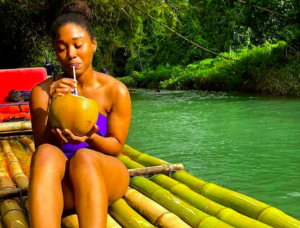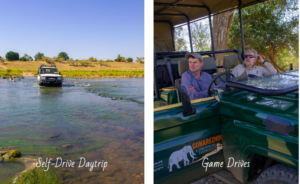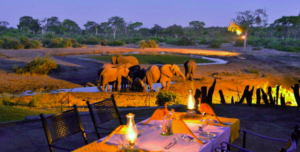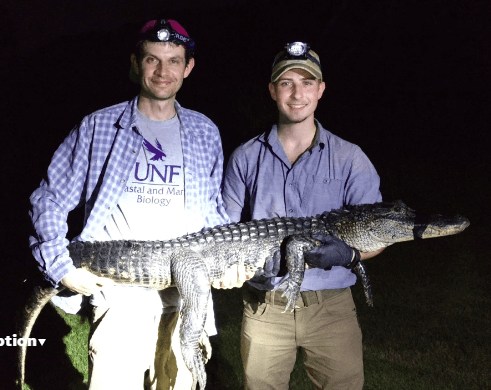
Best State for Alligator Hunting and Their Seasons.
What is an alligator?
Alligators are huge reptiles of the Alligatoridae family. Alligators are semi-aquatic species endemic to the United States and China. They have long, wide snouts, strong bodies, and powerful tails.
Alligators have various distinguishing characteristics that distinguish them from their near relatives, crocodiles. One distinguishing feature is their broad U-shaped snout, which is shorter and broader than crocodiles’ thin V-shaped snout. Alligators also have a larger upper jaw, which hides their teeth when their mouth is closed. Crocodiles, on the other hand, have visible upper and lower teeth when their mouths are closed.
An alligator hunting tour is an exciting adventure that puts you face to face with nature’s top predator. While alligators may be found across the United States, several states have earned a well-deserved reputation as preferred places for this unusual and thrilling hobby.
In this post, we’ll look at the top alligator hunting states, where explorers and nature lovers may experience the heart-pounding excitement of the chase.
Join us as we visit the greatest sites for alligator hunting, from the deep swamplands of Louisiana to the wide marshes of Florida. So gather your stuff and get ready for an incredible adventure in alligator country!
9 Best Alligator Hunting States in USA.
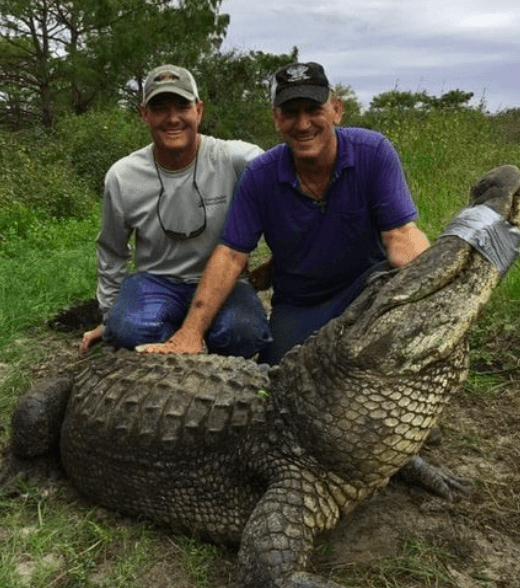
1- Louisiana
The Alligator Kingdom Louisiana, known as the “heartland of alligator hunting,” has a vast network of swamps, bayous, and marshes that provide ideal habitat for these ancient reptiles. With an abundance of alligators and a long hunting season, Louisiana provides hunters with an excellent opportunity to put their talents to the test.
The fascination of hunting is enhanced by the state’s rich cultural legacy, which includes Cajun traditions. From the vast Atchafalaya Basin to the legendary wetlands of the Mississippi Delta, Louisiana delivers spectacular alligator excursions making it one of the Best States for Alligator Hunting. Read full guide on alligator hunting Louisiana.
2- Florida
Florida is a Haven for Thrill Seekers known for its rich fauna, is another strong candidate for alligator hunting. The state’s enormous wetlands, notably the Everglades, provide sufficient opportunity for hunters to meet big populations of alligators.
Florida’s well-regulated hunting seasons and licences guarantee sustainable harvests while preserving the ecosystem’s equilibrium. Furthermore, the Sunshine State’s nice climate, gorgeous landscape, and plenty of outdoor activities make it a popular choice for both local and visiting hunters looking for an adrenaline-fueled adventure. Florida remains one of the best state for Alligator Hunting in USA.
3- Texas:
Everything in Texas is larger, especially the alligators! Texas is home to some of the biggest alligators in the country, making it a perfect destination for trophy-sized captures. The different environments of the state, such as coastal marshes, river systems, and reservoirs, give sufficient hunting opportunities. Texas has a variety of hunting opportunities, including private lands, public waterways, and guided hunts, assuring a variety of experiences to fit diverse tastes. Texas, with its broad landscapes and spectacular alligator specimens, offers a great hunting expedition for both experienced hunters and newbies. Read more on Texas Alligator hunts.
4- Mississippi
Mississippi provides a distinct alligator hunting experience that should not be neglected. Alligators may be found in large numbers in the state’s enormous river systems, lakes, and marshes. Mississippi’s limited hunting licences provide a controlled harvest, which allows for long-term conservation initiatives. Alligator hunting in Mississippi offers a tranquil and immersing vacation for anyone looking for an off-the-beaten-path adventure, with its stunning scenery and serene environment.
5-Georgia
Alligator Thrills and Southern Charm
Georgia, in the southeastern United States, provides an unforgettable alligator hunting experience amidst its gorgeous settings. Hunters may navigate the convoluted waterways in quest of elusive alligators in the Okefenokee Swamp, which has huge marshlands and river systems.
Georgia’s controlled hunting seasons allow hunters to put their talents to the test and catch rare creatures. A hunting vacation to Georgia ensures an outstanding combination of southern charm and thrilling encounters when combined with the state’s warm hospitality and cultural diversity.
6- Alabama
Alabama’s various ecosystems create an enthralling setting for alligator hunting fans. Hunters can explore the twisting creeks and deep forest in quest of these powerful reptiles from the Mobile-Tensaw Delta to the huge coastal marshes.
Alabama’s controlled hunting seasons maintain long-term management while providing several possibilities for exciting encounters. Alabama is a hidden gem for alligator hunting in the South due to the state’s commitment to conservation and preservation of its natural resources.
7- South Carolina (SC):
South Carolina’s coastal marshes, rivers, and barrier islands provide a unique alligator hunting experience. Access to good alligator habitat is provided by the state’s well-maintained wildlife management areas. The regulated hunt programme in South Carolina assures sustainable harvests and carefully managed populations.
You’ll be able to experience the state’s unique biodiversity and make amazing memories as you travel through gorgeous canals and lush wetlands in this off-the-beaten-path hunting paradise.
8- North Carolina (NC):
While not generally linked with alligator hunting, North Carolina’s coastal districts provide unexpected prospects. Alligator populations thrive in the state’s southernmost swamps and marshes, such as the Green Swamp and Alligator River National Wildlife Refuge.
North Carolina’s controlled hunting seasons and licences maintain long-term management while allowing for exciting encounters with these magnificent reptiles. Combine your alligator search with touring the scenic coastline and learning about the state’s unique biodiversity.
9- Arkansas
Arkansas, located in the heart of America, astounds with its healthy alligator population. These prehistoric species thrive in the state’s wide network of rivers, lakes, and bayous. Arkansas has a short but highly wanted alligator hunting season, giving hunters a one-of-a-kind opportunity to put their talents to the test in pursuit of trophy-sized creatures.
Immerse yourself in the magnificent grandeur of Arkansas, from the majestic Mississippi River to the quiet cypress swamps, on an alligator hunting journey that combines the charm of the South with the attraction of the outdoors. Arkansas is a popular spot for Bear Hunts.
Remember to familiarise yourself with each state’s legislation, secure the required licences, and prioritise safety while arranging an alligator hunting expedition. These five states – Louisiana, Florida, Texas, Mississippi, and Georgia – stand out as best alligator hunting states, each with its own distinct attraction and promise of an amazing journey in the world of these awe-inspiring reptiles.
How to Hunt Alligators in USA.
Hunting alligators in the United States often necessitates the acquisition of particular licences and adherence to state rules. Here’s a high-level description of the alligator hunting process:
Examine State Regulations:
Research and become acquainted with the hunting restrictions in the state where you wish to hunt alligators. Each state has its own set of regulations, including seasons, bag restrictions, and permission procedures. For the most up-to-date information, contact the state’s wildlife department or visit their website.
Acquire Permits and Licences:
Special permissions or licences are usually required for alligator hunting. Depending on the state, you may be required to enter a lottery or take part in a regulated hunt. Follow the state wildlife agency’s application process and make sure you fulfil any qualifying restrictions.
Complete Hunter Training:
Before getting an alligator hunting licence, certain jurisdictions may require hunters to finish a hunter education course. These classes teach hunters about hunting safety, rules, and ethics.
Purchase Required Equipment:
Gather alligator hunting equipment, which may include a boat or other means of water transportation, harpoons, snatch hooks, ropes and other weaponry or equipment authorised by state legislation. Make sure you have all of the required equipment for safe and efficient hunting.
Locate and Scout Hunting Areas:
Determine appropriate alligator habitats within the approved hunting regions. To maximise your chances of success, research maps, consult local experts or guides, and investigate suitable hunting spots.
Techniques for Hunting:
Popular alligator hunting strategies include spot-and-stalk, baiting, and employing boats to cross canals and approach alligators. Learn and practise the precise methods associated with your preferred hunting approach.
Follow Safety Guidelines:
Alligator hunting is inherently risky, therefore always prioritise safety. Maintain awareness of your surroundings, utilise adequate equipment, and adhere to weapon safety regulations. To reduce the danger of accidents, learn about alligator behaviour and warning indications.
Abide by Regulations:
All state rules, including bag limitations, size restrictions, and reporting requirements, must be followed. Respect conservation efforts and maintain sustainable hunting practises to guarantee alligator populations are protected for future generations.
Harvest Processing and Utilisation:
Following a successful hunt, properly prepare the captured alligator. Learn correct field dressing procedures or hire a professional to prepare meat, skin, and other components in accordance with legal and ethical norms.
Remember that the particular processes and criteria differ by state, so make sure to check the laws and recommendations supplied by the state wildlife department where you intend to hunt alligators. To guarantee a responsible and pleasurable hunting experience, always prioritise safety, ethics, and compliance with local regulations.
What are the alligator species in the United States?
The American alligator (Alligator mississippiensis) is the most common alligator in the United States. The American alligator is endemic to the southeastern United States and may be found in the following states:
The American alligator is North America’s biggest reptile and is well-adapted to a range of freshwater environments including swamps, marshes, rivers, lakes, and coastal locations. It is distinguished by its large snout, black colouring, and ability to flourish in a variety of habitats.
While the American alligator is the most common species in the United States, other crocodilians may be found all over the world, including the Nile crocodile in Africa, the saltwater crocodile in Australia and Southeast Asia, and the Chinese alligator in China.
How do alligators feed?
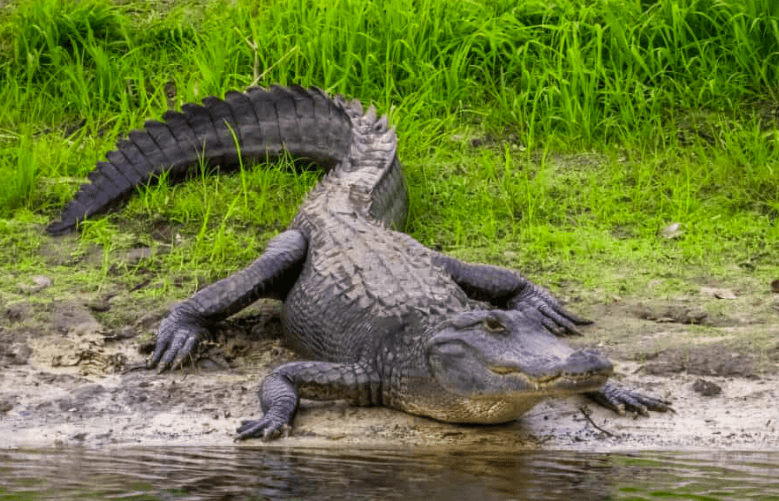
Alligators are carnivorous predators with a variety of feeding techniques for capturing and devouring their prey. Here’s a rundown of how alligators eat:
Ambush Predators:
Alligators are well-known for their propensity to wait in the water, often partially submerged, for unsuspecting prey to approach within striking reach. They are patient predators who can remain immobile for long periods of time, depending on their camouflage and stealth to catch their prey off guard.
Strong Bite:
Alligators use their formidable jaws to deliver a lightning-fast bite when an opportunity presents itself. They have a powerful bite that may break bones and overwhelm their prey. Their jaws are highly designed for gripping and clinging onto prey, making escape impossible.
Dragging Prey:
When an alligator takes its victim, it drags it into the water or to a safe eating spot using its muscular body and powerful tail. This behaviour allows them to avoid competition from other predators and reduces the likelihood of stealing.
Prey Submerging:
Alligators frequently drown their prey by submerging it underwater. They can soften the flesh and make it simpler to break apart and swallow by keeping the victim underwater.
Tearing and ripping:
Alligators have sharp, conical teeth that are meant to grasp and puncture. its teeth are used to rip apart its prey into smaller, more manageable pieces. Alligators can consume smaller food whole, while bigger prey may be ripped into digestible parts.
Digestion:
Alligators have a strong digestive system that allows them to eat a broad variety of animals. Because of their powerful stomach acids, they can digest bones, shells, and other difficult materials. Alligators may spend hours or even days digesting their meal after swallowing it.
It’s crucial to remember that alligators are wild creatures and should be approached with caution. Interacting with or feeding alligators may be harmful, and it is often outlawed by law to protect both humans and alligators.
Estimated Alligator population by State
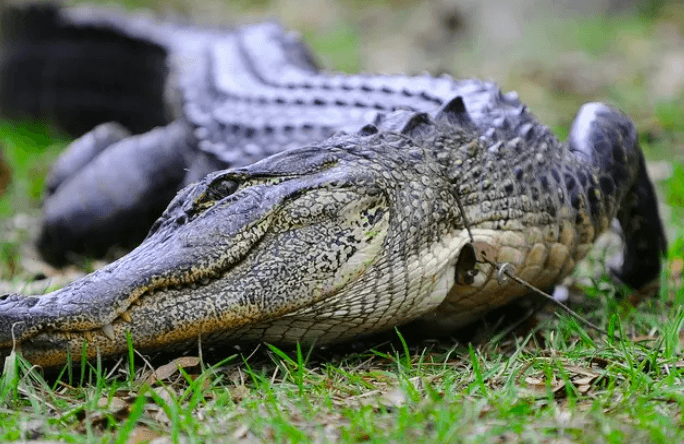
Florida:
Florida is said to have the greatest alligator population in the United States, with estimates ranging from 1 to 1.5 million alligators.
Louisiana:
Louisiana is well-known for its large alligator population, which is estimated to number between 1 and 2 million alligators.
Texas:
Texas has a sizable alligator population, with estimates ranging from 300,000 to 500,000.
Mississippi:
Mississippi’s alligator population is believed to be between 30,000 and 35,000 alligators.
Alabama:
Alabama is thought to have an alligator population of 200,000 to 250,000 alligators.
South Carolina (SC):
South Carolina’s alligator population is believed to be over 100,000 alligators.
These estimates are meant to give a rough understanding of the alligator populations in these states and should not be taken as accurate statistics. It is best to visit state wildlife authorities or organisations devoted to alligator conservation in each state for the most up-to-date information.
How long does an alligator live?
Alligators are long-lived reptiles that survive for a long time. Wild alligators may live for 30 to 50 years on average. Alligators may live even longer in captivity, where they are safe from predators and have access to perfect surroundings, with some individuals reaching the age of 60.
A variety of factors can impact an alligator’s life expectancy, including habitat quality, food availability, predation danger, and general health. Alligators have evolved to be well-adapted to their habitats, and if conditions are favourable, they may live for several decades.
FAQs About Alligator Hunting in USA Answered.
Is alligator hunting legal in the United States?
Yes, alligator hunting is permitted in several states in the United States.
Which states permit alligator hunting?
Louisiana, Florida, Texas, Mississippi, Alabama, South Carolina, Arkansas, and North Carolina are among the states that allow alligator hunting.
When is the ideal time to go alligator hunting?
The optimal period for alligator hunting varies by state, although it usually falls between late summer and early autumn, when alligators are most active.
How can I obtain an alligator hunting licence?
Every state has its own licencing system. You would typically need to apply for an alligator hunting permit through the state’s wildlife office and satisfy certain standards.
Can I go alligator hunting on public lands?
It is determined by the state and its unique rules. Some states authorise alligator hunting on public grounds, but others impose limitations or need permission.
Do I need a special permit to hunt alligators?
To hunt alligators, a specific permit or alligator hunting licence is usually necessary.
Are there any size limitations on the alligators I may hunt?
Yes, the size of alligators that may be hunted is typically limited. These regulations, which may differ by state, are meant to encourage sustainable harvesting and conservation.
What do I need to go alligator hunting?
Harpoons, snatch hooks, weapons (where permitted), strong ropes, and a boat or other means of navigation are typically employed for alligator hunting.
Can I hunt alligators with a firearm?
Some states allow the use of weapons for alligator hunting. However, restrictions on the type of firearm and ammunition permitted may apply.
Is it safe to go alligator hunting?
Alligator hunting is risky by nature. Following safety rules, being aware of your surroundings, and having expertise or education in managing alligators or traversing their habitats are all essential.
Are there any specialised alligator hunting techniques?
Spot-and-stalk, baiting, and employing boats to cross canals and approach alligators are all common hunting strategies.
Can I use bait to attract alligators while hunting?
Baiting laws differ from state to state. Some states allow alligator baiting, while others impose limits or outright prohibit it.
Are there any alligator hunting bag restrictions or quotas?
Yes, bag restrictions or quotas are commonly used to maintain sustainable harvests and population control. These regulations may differ by state and may include limits on the quantity and size of alligators that can be taken.
Is there a season for hunting alligators?
Yes, each state’s wildlife department normally establishes alligator hunting seasons. These seasons usually occur in the late summer or early autumn.
Is there any conservation work going on to safeguard alligator populations?
Yes, conservation initiatives safeguard and regulate alligator populations. These activities include population monitoring, hunting rules implementation, and habitat protection projects.
Can I sell the alligator flesh, hide, or other components that I catch?
The laws governing the selling of alligator parts differ from state to state. Commercial sales are authorised in certain states, but are restricted to licenced persons or forbidden entirely in others.
Related post
- Thrilling Boar Hunting Adventures in Hungary: Unleash Your Inner Hunter.
- Roaming the Vast Plains: Utah Bison Hunts Unveiled.
- Montana Buffalo Hunting: All You Need To Know Before A Hunt.
- Bison Hunting in the USA: “Exploring the Best States for an Unforgettable Adventure”.


